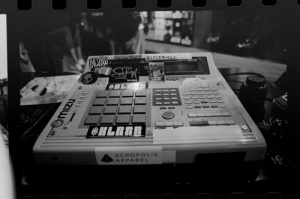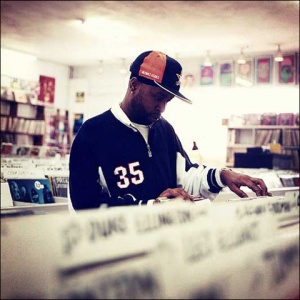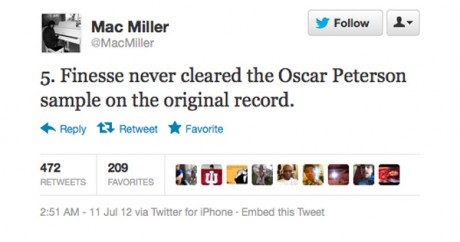Sampling (hip hop)
Sampling (hip hop)
Hip hop producer Pete Rock]]Hip hop Sampling is the art of picking a segment of music from one song and implementing that segment into a different song in a variety of ways. Sampling actually originated years before hip hop was originated by recording acoustic sounds and playing them slowed down, sped up, and backwards. In hip hop the section that is normally sampled is the break, or percussion section. The break serves as the basis for the beat of the new song. Taking music from other artists and editing it to make something new is both supported and condemned, but sampling continues to be a huge part of popular music today.Background
Sampling takes place in many different genres, but hip-hop was founded upon the art of sampling. With the use of turntables in the 1970’s Bronx, hip-hop was born. Sampling has been brought to the forefront by hip hop, because it is the first popular music genre that uses sampling so consistently. Although hip-hop music is known to have limited content, many of its samples draw from different genres. Some of the most iconic hip-hop songs sample from genres other than hip hop. Pete Rock & CL Smooth’s “They Reminisce Over You (TROY)” samples The Beginning of the End’s “When She Made Me Promise.” The legendary hip-hop crew, A Tribe Called Quest, sampled rock music in one of their most recognizable songs, “Can I Kick It.” They pulled sounds from Lou Reed’s “Walk on the Wild Side” to make one of hip hop’s most iconic songs of all time.
Controversy
Artists
Since its inception, hip hop has been surrounded in controversy. Whether it’s NWA’s protest music or Eminem’s horrorcore, everybody seems to have an opinion on hip hop music/culture. Before it transcended into the mainstream music industry, hip hop was often written off because of its use of sampling. Many critics believed that sampling wasn’t real art because DJ’s were other artist’s work, adding to it, and passing it off as their own. A lot of times the music these artists are borrowing from is made by artists that have passed away and don’t receive the credit they deserve. At the same time artists that get their music sampled by these big-named hip hop acts get their work reinvented. A lot of times hip hop artists sample bands that never had major mainstream success, but when the likes of a Lil Wayne or Kanye West raps over a beat that samples one of their records, they not only get compensation but they also get recognition from a younger generation.Legal
In today’s society things get even trickier because many rappers give their music away for free. If artists aren’t charging for their music and not making money off of downloads, then many of those artists feel that they don’t need to pay any sort of royalties to the original artist.
This is particularly true for Philadelphia MC, Mac Miller. He is the first person on an independent label to reach #1 on the Bilboard 200 charts since Snoop Dogg’s debut album. Mac Miller is currently getting sued for using a beat that wasn’t his on a song he gave away for free years before he got famous. Many would argue that what Mac Miller did is the essence of hip hop. Ironically enough Lord Finesse, the maker of the beat, used a sample in the original beat that he may or may not have originally payed for.
Similarly, Kanye West is well known for sampling in his music. West has been known to sample everything from Bon Iver to Curtis Mayfield. Recently he has been sued for his use of a sample on his latest album, My Beautiful Dark Twisted Fantasy. Kanye West made headlines with his use of a sample from Daft Punk’s “Harder, Better, Faster, Stronger.” He has been getting flack for sampling so much in his music, and, finally, West is being sued for copyright infringement for a sample that he used on two different tracks.
Now that hip hop is woven into the social fabric of popular culture, the genre has become extremely lucrative. In turn, sampled music is getting more attention than ever. Those artists that are being sampled are rightly seeking credit for their work, and the argument of copyright infringement continues to develop with the rest of the genre.



